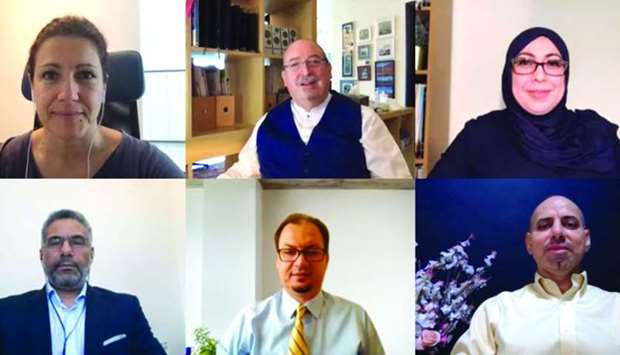A new cluster project led by the Qatar Environment and Energy Research Institute (Qeeri) at Hamad Bin Khalifa University (HBKU) will focus on reducing atmospheric carbon dioxide and having a positive impact on climate change challenges.
Development of a Highly Efficient and Practical Carbon Management System for Improving Qatar’s Sustainability: A Holistic Approach aims to develop an efficient and practical carbon management system. In doing so, Qeeri will also collaborate with Qatar University and Qatar Green Building Council (QGBC).
Using innovative materials, the proposed technology aims for having the capacity to reduce atmospheric carbon dioxide (CO2) concentrations by capturing excess CO2 directly from the atmosphere, improving indoor air by channeling these captured gases to agricultural greenhouses, and also converting it into value-added products. These solutions will have positive impacts on climate change, health, food security and the diversification of the economy respectively, thus contributing to the objectives of Qatar National Vision 2030.
Dr Abdulkarem Amhamed, acting research programme director for energy efficiency at Qeeri’s Energy Centre and the cluster programme lead, said: “We are very proud to launch this unique project, and reiterate our commitment to building research and technology that can provide tangible solutions to make a more sustainable future for Qatar”.
Dr Amhamed said the lead principal investigators for the various sub-projects within the cluster are: Dr Fadwa El-Mellouhi from Qeeri; Prof Muftah El-Naas and Dr Ahmed Khalifa, both from Qatar University; and Dr Alex Amato from QGBC.
The key partners and stakeholders involved in the cluster are the Ministry of Municipality and Environment (ME), Kahramaa, Agrico, Qatar Shell, Innovate Calgary, VITO, University of Calgary, Trinity College Dublin, Imperial College London, Georgia State University and Leibniz Centre for Agricultural Landscape Research.
“We’re also excited to be in partnership with our colleagues at HBKU’s Qatar Biomedical Research Institute and Qatar Computing Research Institute. All in all, we’re looking forward to working together to achieve our common goals,” he added.
The project has been awarded the highest grant under the second cycle of Qatar National Research Fund’s National Priorities Research Programme Cluster Track (NPRP-C) with $4,990,734 for five years. An additional co-funding amount of $1,400,285 will take the total project budget to $6,391,019.
Dr Abdul Sattar al-Taie, executive director of QNRF, said: “We believe this cluster project - led by Qeeri and featuring leading national research organisations such as Qatar University, the MME, Kahramaa, Qatar Shell and QGBC - will ensure that Qatar benefits from the research outcomes, and will strengthen mutually beneficial and constructive collaborations between relevant local and international stakeholders.”
Dr Marc Vermeersch, executive director of Qeeri, added: “This outstanding project will not only contribute to supporting Qatar to tackle its grand challenges in energy, water and the environment but also build a platform to further enhance collaborations among national stakeholders, and promote in-country capacity building through the involvement of graduate students.”
The combined efforts of the team and the success of this cluster project will bolster Qatar’s image as a key player in the global fight against climate change.
Using innovative materials, the proposed technology aims for having the capacity to reduce atmospheric carbon dioxide (CO2) concentrations by capturing excess CO2 directly from the atmosphere, improving indoor air by channeling these captured gases to agricultural greenhouses, and also converting it into value-added products. These solutions will have positive impacts on climate change, health, food security and the diversification of the economy respectively, thus contributing to the objectives of Qatar National Vision 2030.
Dr Abdulkarem Amhamed, acting research programme director for energy efficiency at Qeeri’s Energy Centre and the cluster programme lead, said: “We are very proud to launch this unique project, and reiterate our commitment to building research and technology that can provide tangible solutions to make a more sustainable future for Qatar”.
Dr Amhamed said the lead principal investigators for the various sub-projects within the cluster are: Dr Fadwa El-Mellouhi from Qeeri; Prof Muftah El-Naas and Dr Ahmed Khalifa, both from Qatar University; and Dr Alex Amato from QGBC.
The key partners and stakeholders involved in the cluster are the Ministry of Municipality and Environment (ME), Kahramaa, Agrico, Qatar Shell, Innovate Calgary, VITO, University of Calgary, Trinity College Dublin, Imperial College London, Georgia State University and Leibniz Centre for Agricultural Landscape Research.
“We’re also excited to be in partnership with our colleagues at HBKU’s Qatar Biomedical Research Institute and Qatar Computing Research Institute. All in all, we’re looking forward to working together to achieve our common goals,” he added.
The project has been awarded the highest grant under the second cycle of Qatar National Research Fund’s National Priorities Research Programme Cluster Track (NPRP-C) with $4,990,734 for five years. An additional co-funding amount of $1,400,285 will take the total project budget to $6,391,019.
Dr Abdul Sattar al-Taie, executive director of QNRF, said: “We believe this cluster project - led by Qeeri and featuring leading national research organisations such as Qatar University, the MME, Kahramaa, Qatar Shell and QGBC - will ensure that Qatar benefits from the research outcomes, and will strengthen mutually beneficial and constructive collaborations between relevant local and international stakeholders.”
Dr Marc Vermeersch, executive director of Qeeri, added: “This outstanding project will not only contribute to supporting Qatar to tackle its grand challenges in energy, water and the environment but also build a platform to further enhance collaborations among national stakeholders, and promote in-country capacity building through the involvement of graduate students.”
The combined efforts of the team and the success of this cluster project will bolster Qatar’s image as a key player in the global fight against climate change.

